
Almost every day San Francisco Tenderloin resident D, who worked as a bartender before the pandemic, brings donated supplies and clothing to distribute to people living on the street next to her building. She calls her neighborhood a “dystopia.”


People wait in line for donated clothing outside of St Anthony’s, a mainstay of homeless outreach in San Francisco. Further down the block is another even longer queue, for meals from GLIDE Memorial Church.
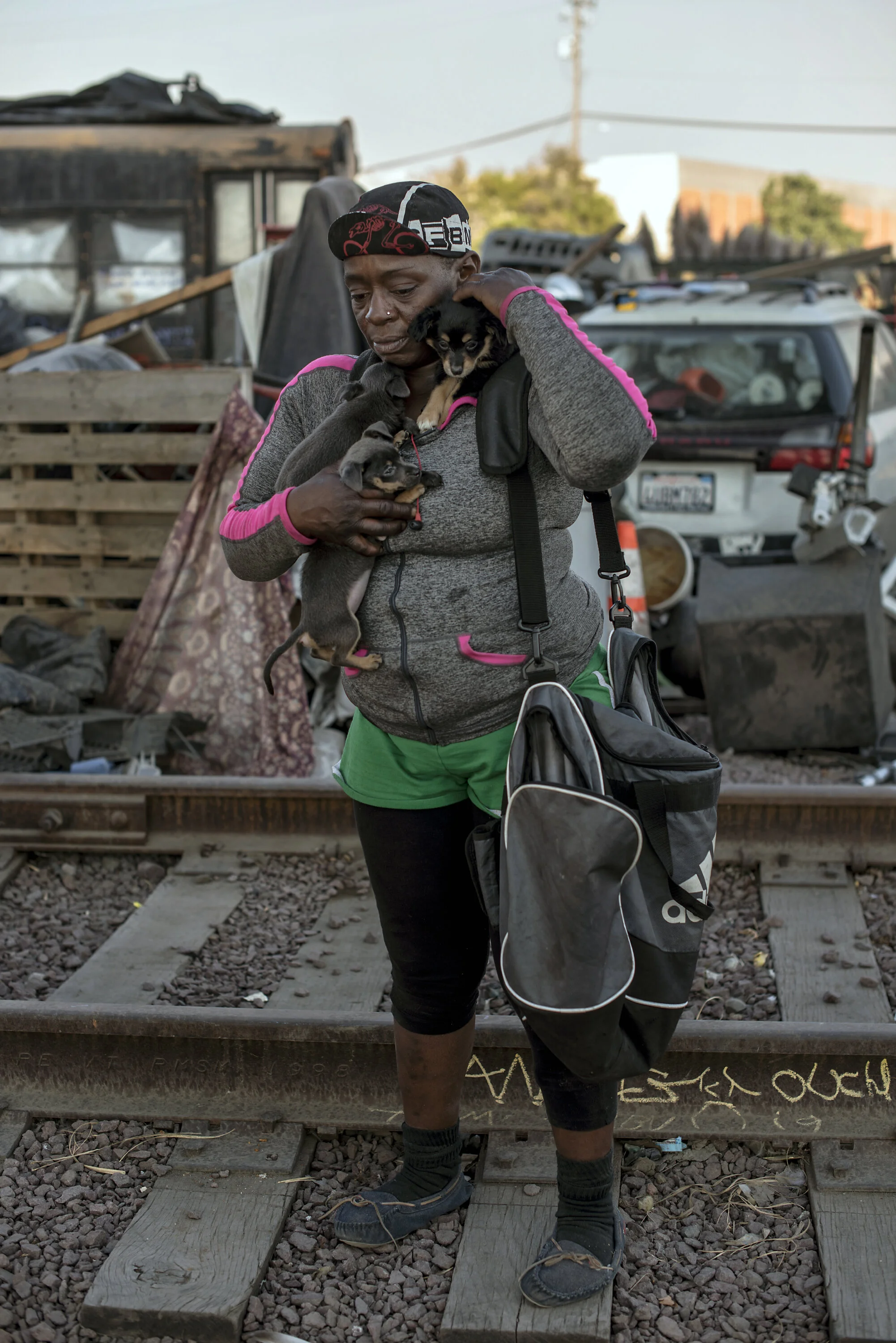
When her dog had a litter of puppies, M became their second mother, as they pile on her for comfort and love. She stands in front of the vehicle that was her father’s until he died in December. She will be living there for another week until she becomes the first recipient of a guerrilla Tiny Home unit at this Oakland Wood Street camp constructed by the activist group Artists Building Communities.

About 70 tents suddenly moved in around the Asian Art Museum when SF govt allowed camping in certain parts of Civic Center in late April to ease crowding on the streets enabled by the pandemic shutdown. This lasted until the Fulton St camp opened up in the middle of the parking area.

A lives in a tent on Willow St in San Francisco’s Tenderloin District. After spending the last hour sweeping garbage off the street, he washes himself with a bottle of water.
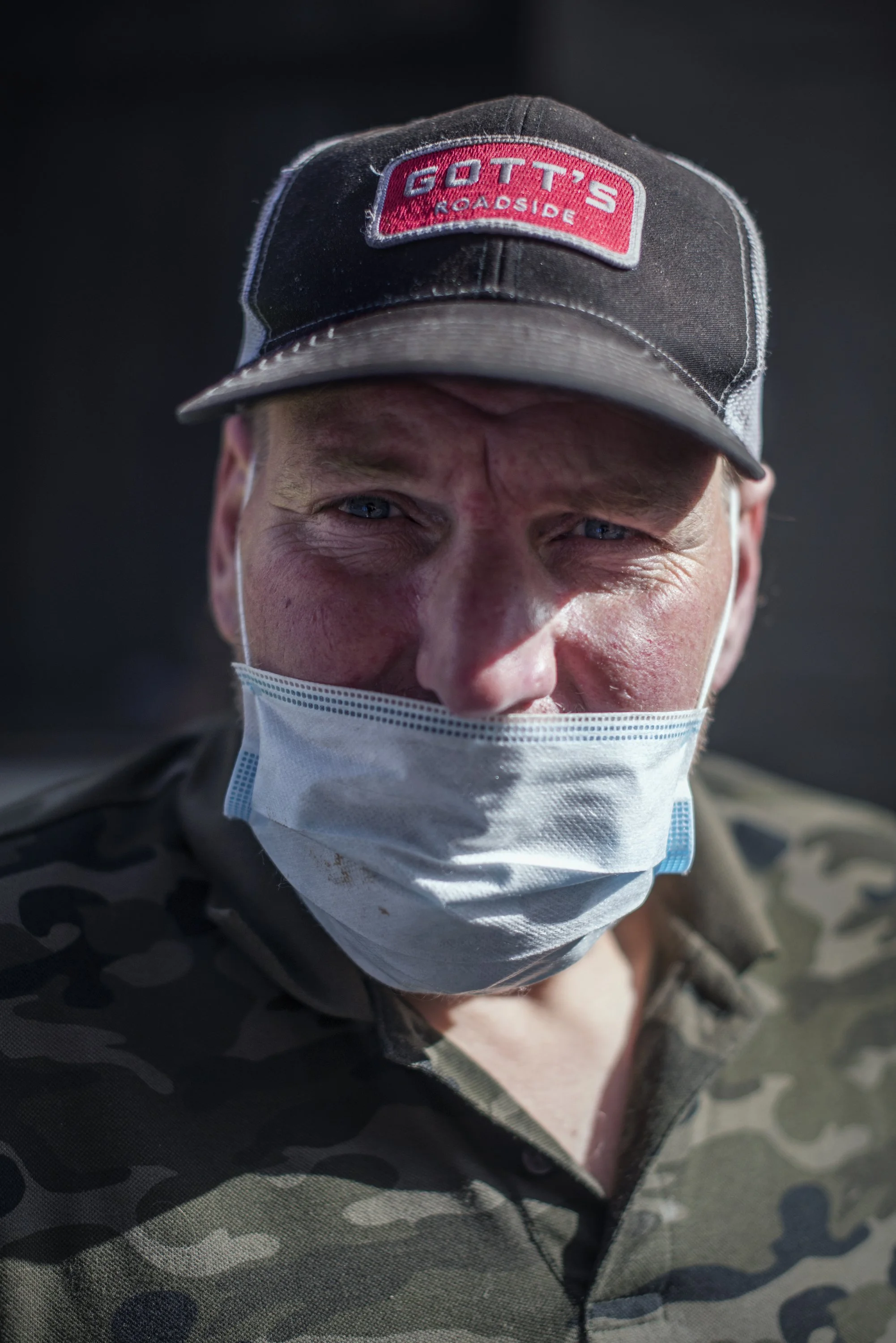
J lives in a tent on 12th St but comes to the Tenderloin to score drugs with his friends. He used to work at Gott’s, a gourmet burger restaurant.

The non profit group West Oakland Punks With Lunch distributes peanut butter and jelly sandwiches, goldfish crackers, yogurt covered blueberries, condoms, water and harm reduction drug usage kits. This happens weekly at Peralta and 35th with the Curbside Clinic also providing basic medical attention, supplies, thermometer readings. Before interacting with each other, everybody must clean their hands at the portable wash station, as J does here.
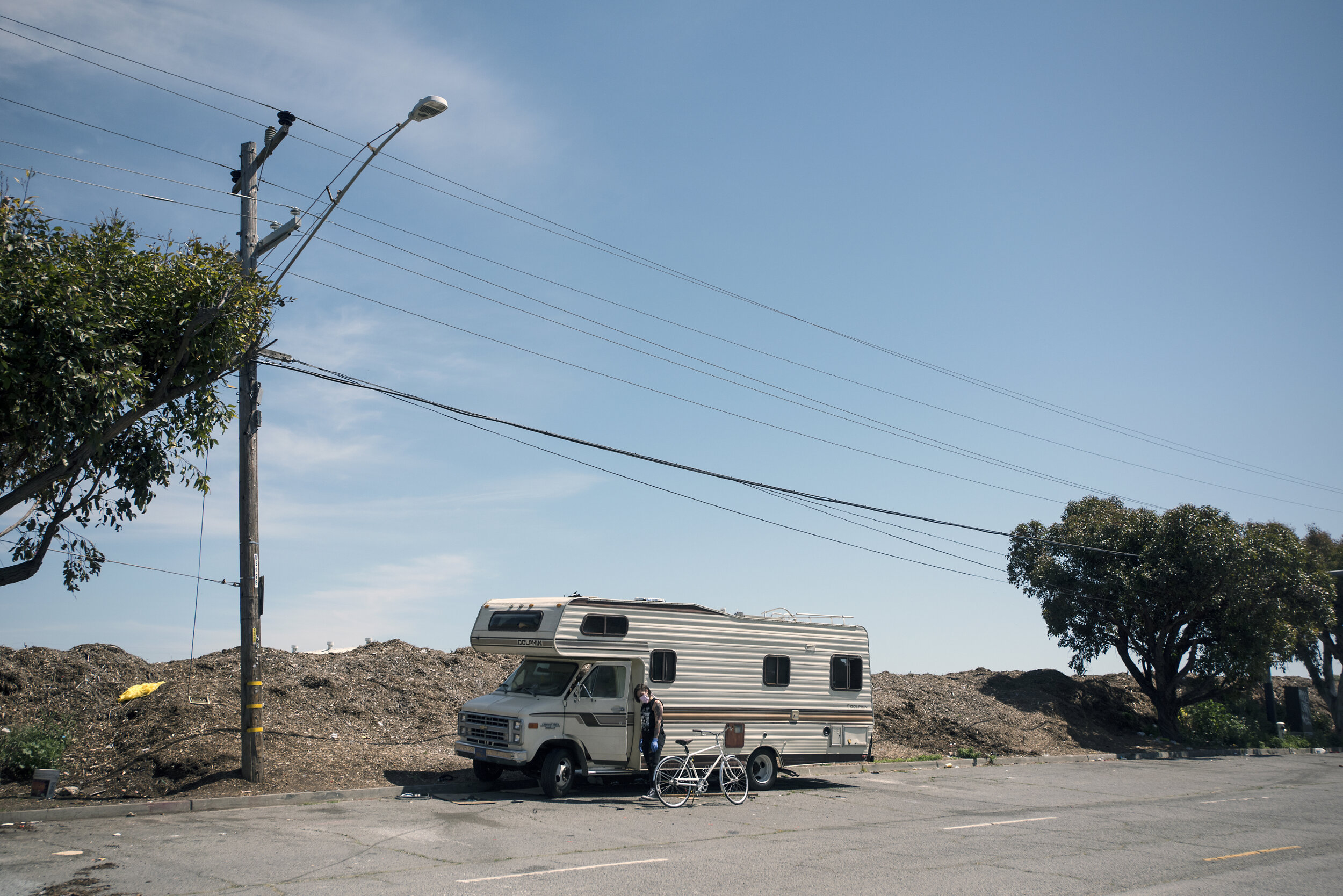
A, a member of the GLIDE outreach team, drops off food, supplies and tents throughout San Francisco, including isolated dwellings like this mobile home near Candlestick Park.

Residents of a San Francisco homeless encampment at Connecticut and 17th, K and S discuss a scooter that was stolen from him and their overall suspicion of the police.
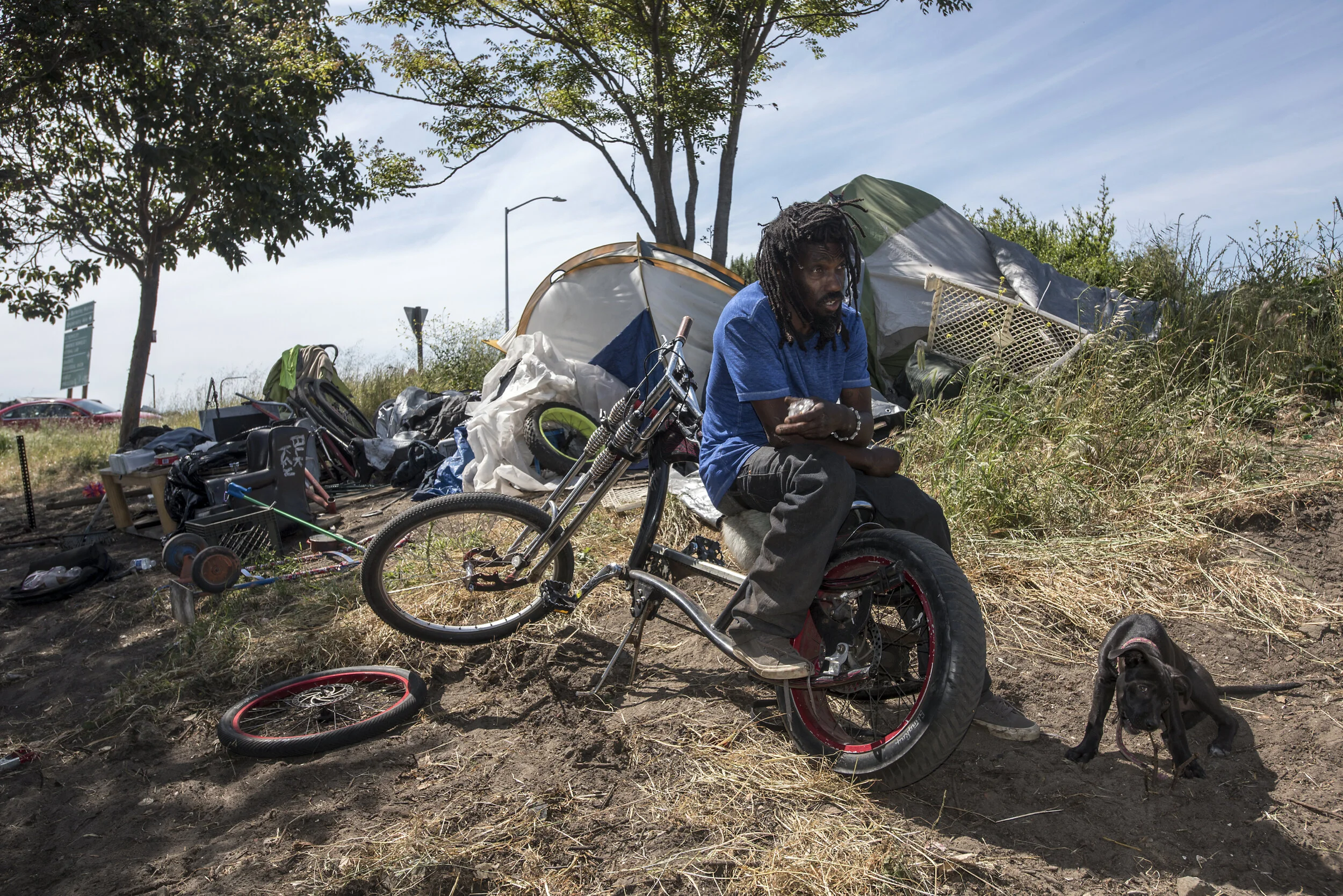
K currently lives with his puppy Z near the University Street freeway exit in Berkeley. He is originally from Oakland and has been unhoused 5 years. Of the homeless he says, “We are all black as far as they are concerned.” He believes the pandemic started as a conspiracy to keep the underclass down, but, the “whatever covid is, it backfired.”
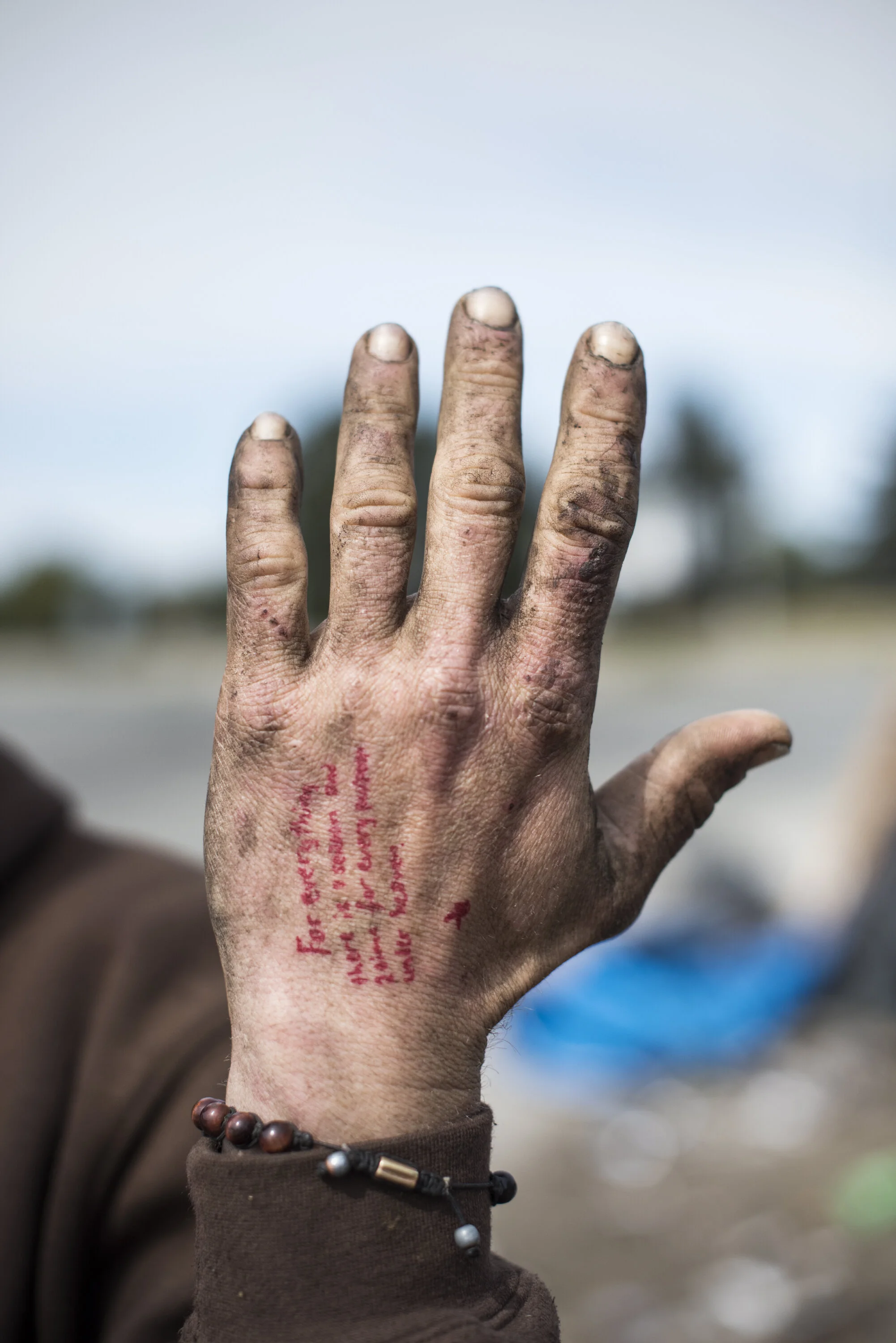
On his hand, E has written Ecclesiastes 3:1, “For every thing there is a season, and a time for every purpose under the heaven. E, 40, came to Berkeley from Ohio by way of Denver. He has been homeless for five years. “What’s going on out here is not ok,” he says. “The only impact covid is having on us is the quarantine.”
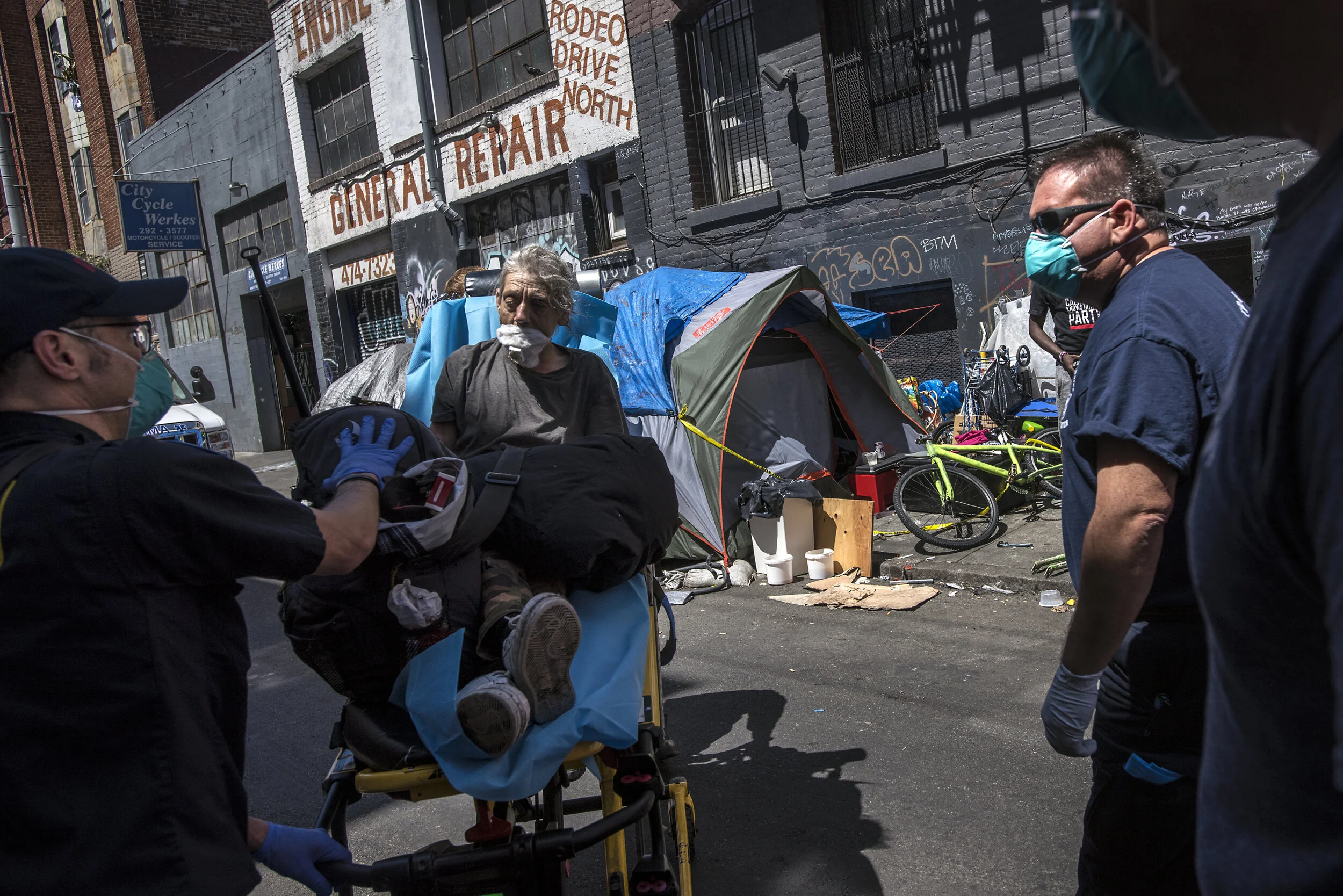
San Francisco Fire Department paramedics pick up a woman who overdosed on Willow St in the Tenderloin. A policeman saw her lying motionless on the sidewalk, and alerted her neighbors who revived her with Narcan before the paramedics arrived. The paramedics say they see something like a half-dozen overdoses a day in this neighborhood.
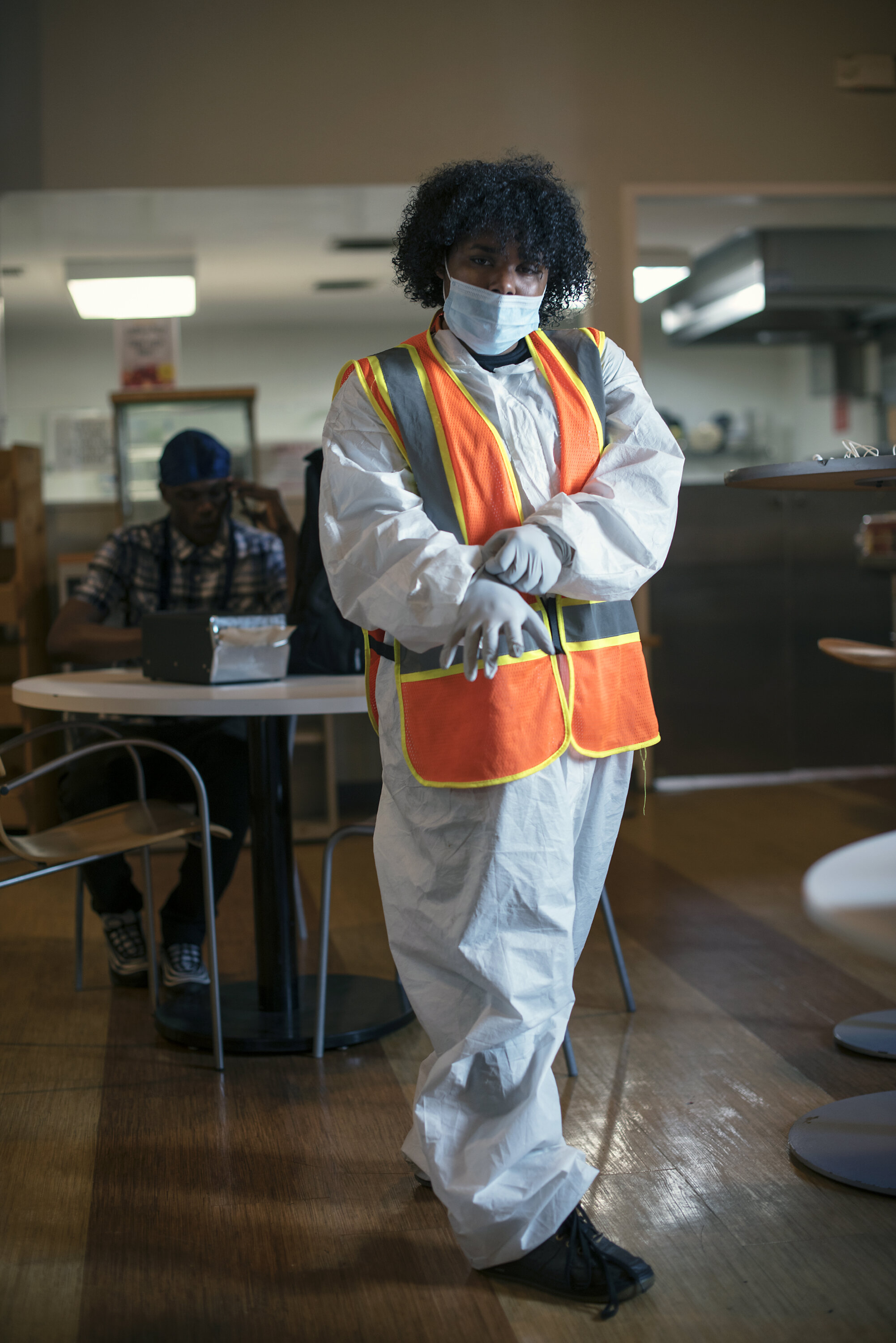
L, 22, just started working for the non-profit Urban Alchemy, monitoring mobile toilets. She had been couch-surfing in Stockton but came to San Francisco to be near her brother who is serving time in prison for murder. Now she has a SRO for housing. Her two young children live with her grandparents in Modesto. She comes to Larkin Youth Services to study for the GED, eat and talk to counselors. She says, “I want set a positive example. I dont want my kids to face homelessness."
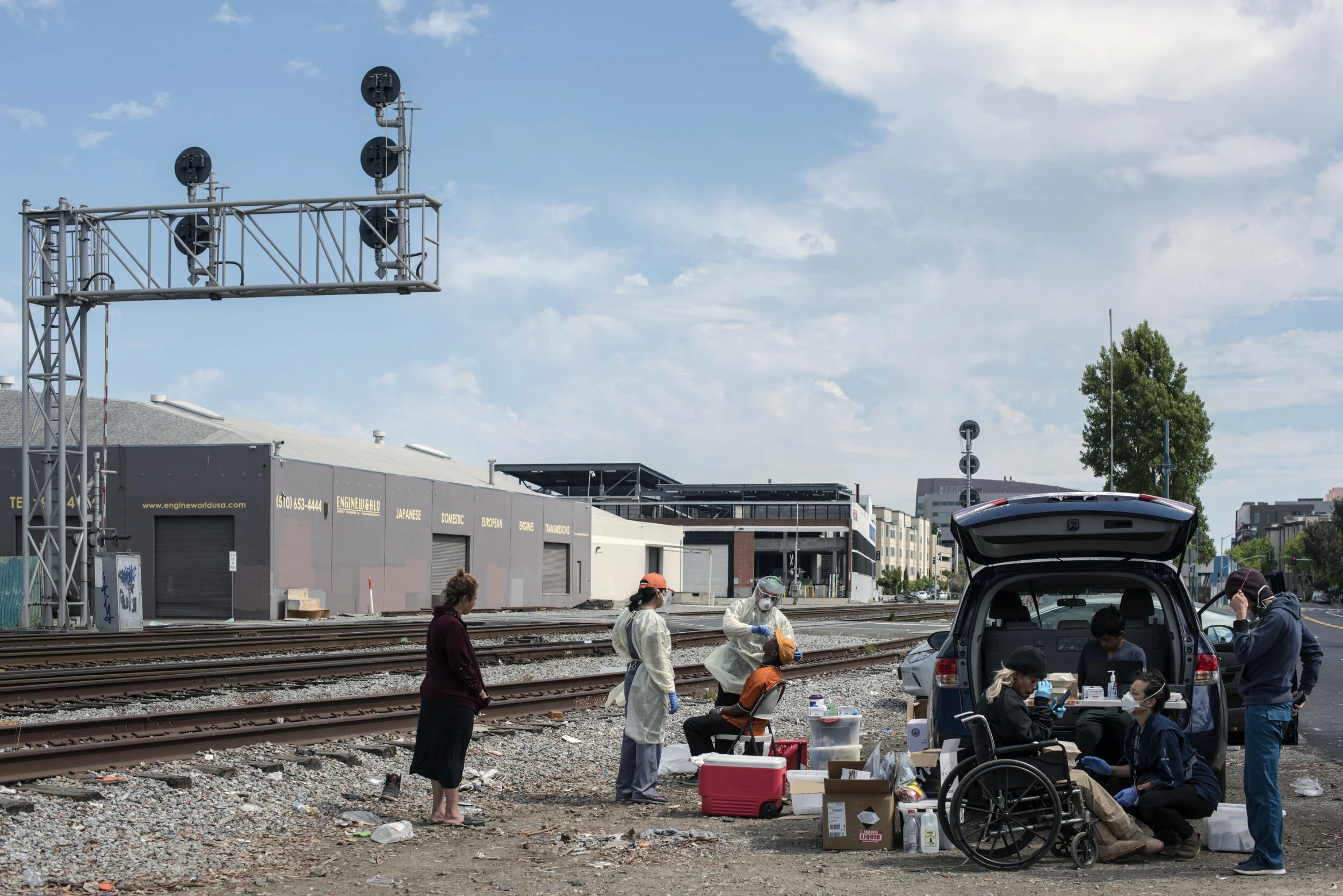
Berkeley’s Lifelong Medical Center Street Medicine Team does testing and other treatment at the Ashy-Shellmound homeless encampment, where recently a positive case was discovered.

J has been on and off the San Francisco streets for years. At the beginning of the shutdown he was able to stay in a friend's one bedroom apartment, which is now crowded with two more people. John sleeps on the floor in closet. When things were open, John worked cleaning up at a couple of SoMa bars. Now his only source of income is setting up various farmers markets.
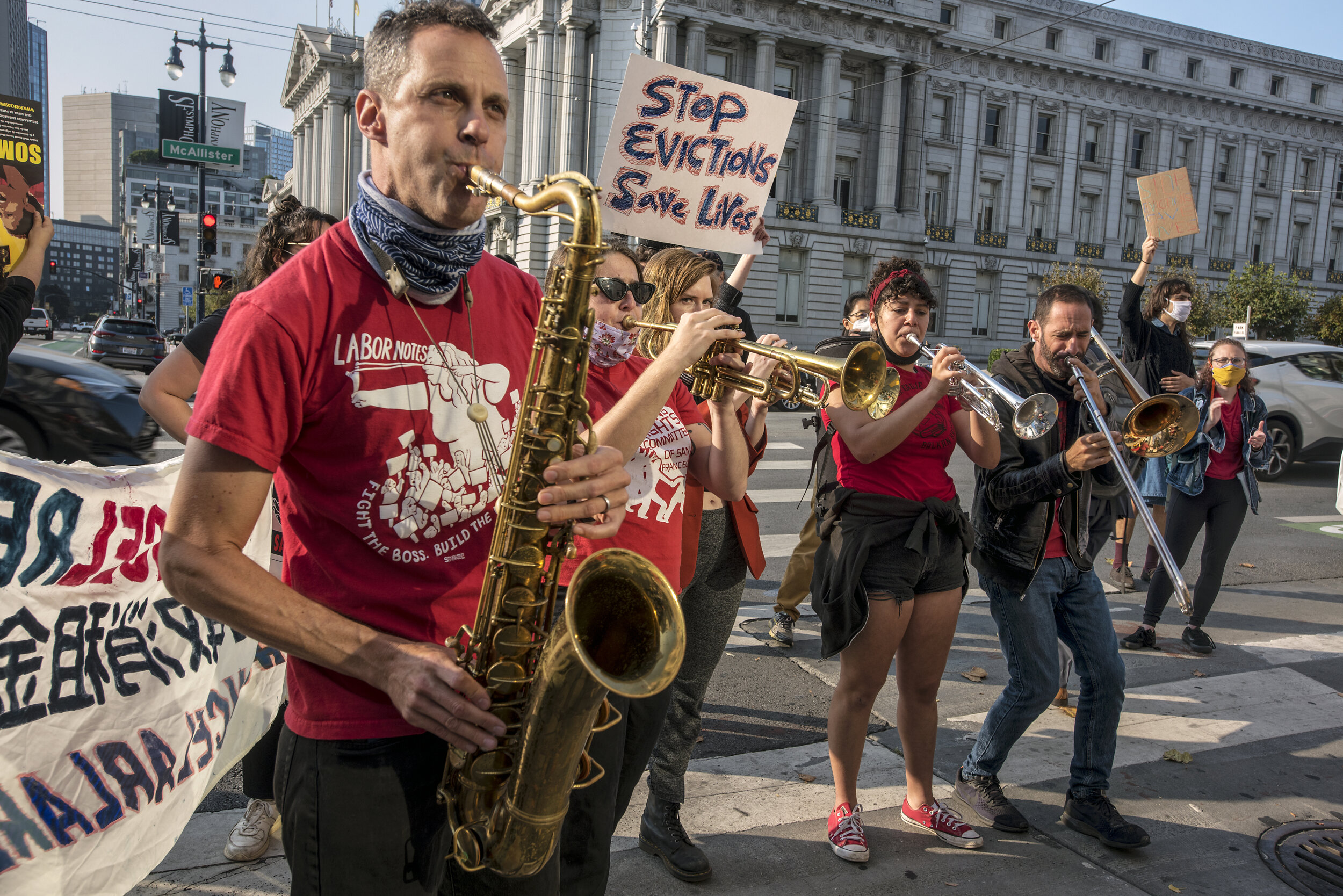
The Liberation Brass Orchestra plays in support of an anti-eviction rally. Social media posting by the Housing Rights Committee of San Francisco: “On September 21st, SF courts will be evicting tenants. That can't happen. Housing is a human right - let's show up together in solidarity!! Rally at the Courthouse (400 McAllister) Stand in solidarity with our neighbors facing eviction. Chant, cheer and hear from community members facing eviction.”
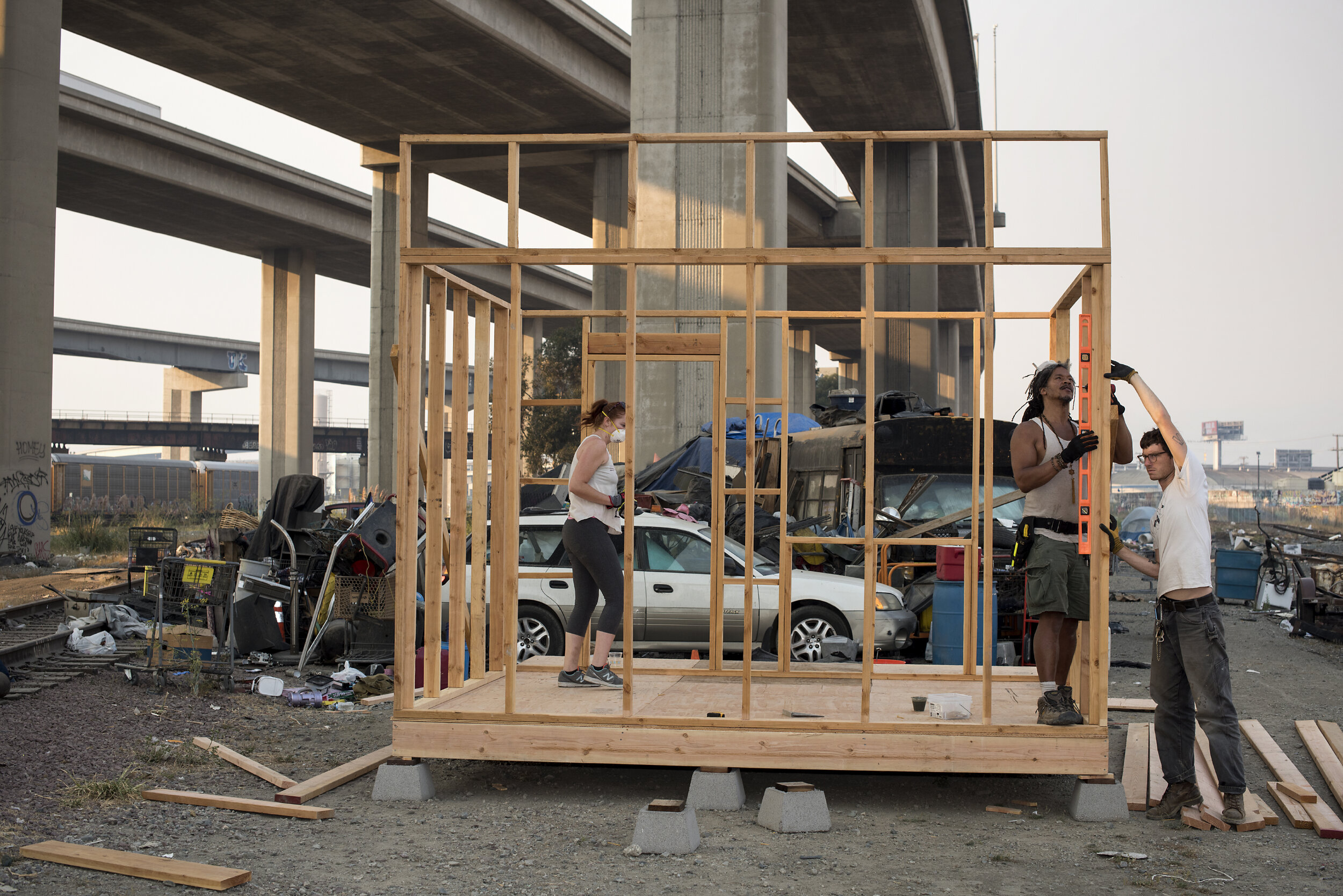
K, J and B volunteer with Artists Buildiing Communities to build a 10x10 foot tiny home (with a porch) for homeless resident of Wood Street in Oakland, Mona Choyce. J, who designed the structure, is a professional theater set builder who is a currently out of work due to the pandemic shutdown.
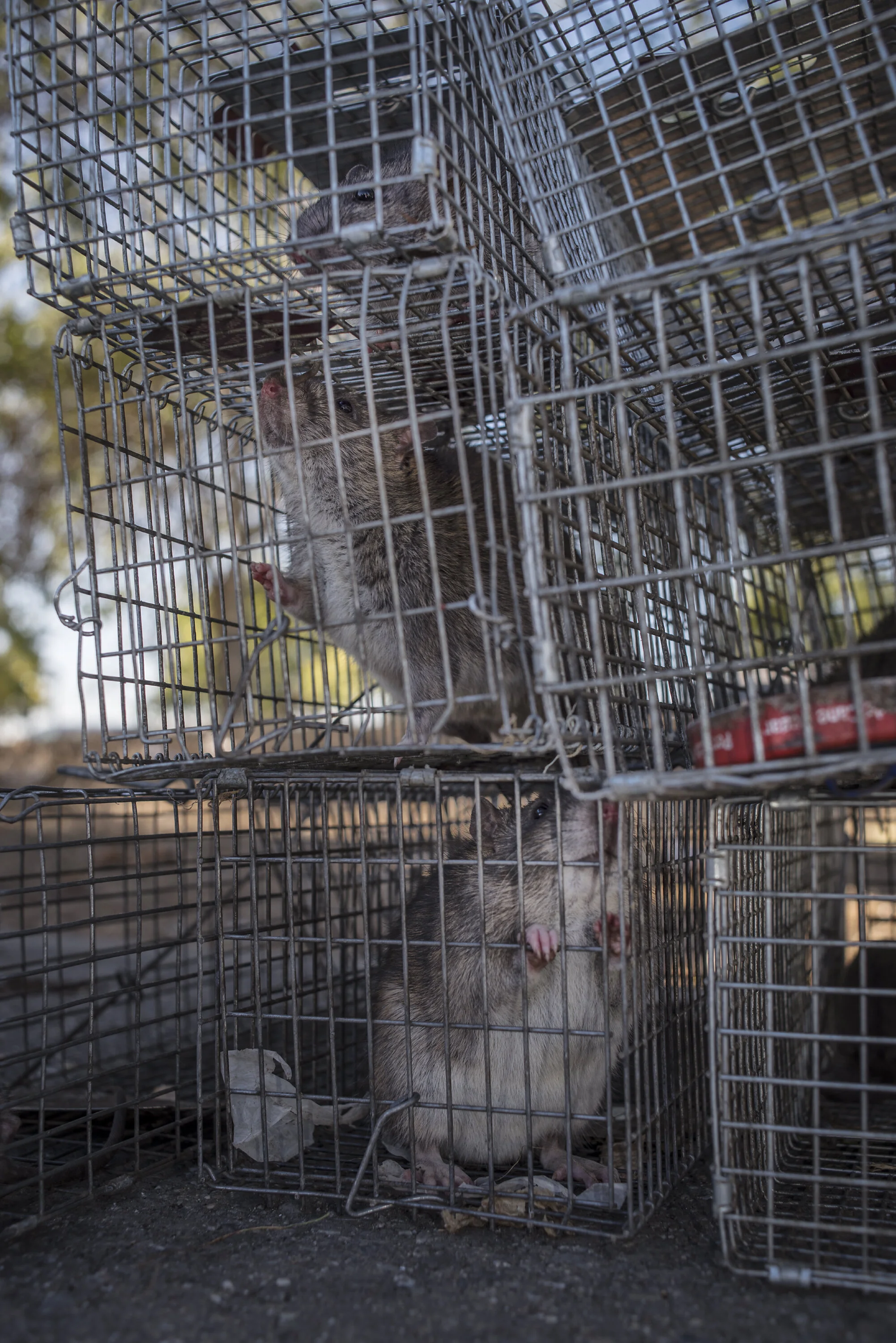
Rats from the Oakland Union Point homeless camp are trapped by the Alameda County Vector Control Disease Study team. Rats are a huge problem for the unsheltered population - carrying ticks, fleas, rabies and other diseases while stealing food, biting people and gnawing holes in nylon tents and plastic storage bins. The trapped rats are euthaniszed and analyzed in the lab. This is the only county in California that provides this service for homeless camps Part of the study is to see if any diseases, including covid and bubonic plague, correspond to rats found in Los Angeles homeless camps.

Suspicious fire burned down a vacant building at Union Point Marina in Oakland. No one was hurt but at least two of unhoused people lost their belongings in the fire, which spread to nearby tents. The firefighters let M in past the police lines to rescue his mobile phone from his shelter next to the fence, which was then bombarded by water to douse the last smoldering bits of debris. The residents think the harbor master set the fire on purpose; others believe it may have been an accident caused by someone trying to stay warm during the early morning cold.
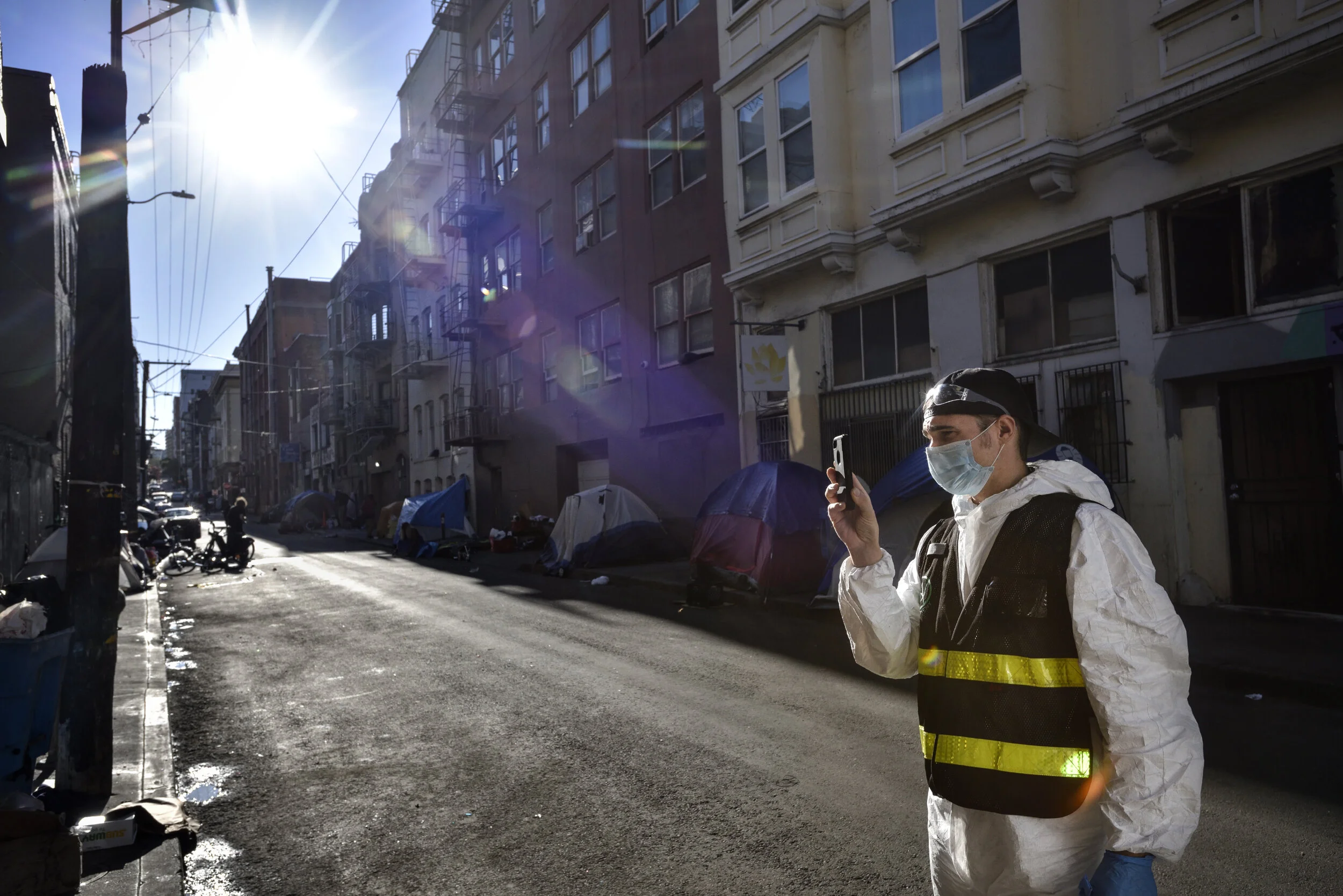
B works for Urban Alchemy, which started providing portable toilets in San Francisco’s Tenderloin District after Covid19 started affecting the city. One of the responsibilities, he says, is to make sure drug users who use the facilities don’t overdose while on the toilet. About fifteen minutes after applying a Narcan shot to literally save the life of one of these overdose victims, he talks with a buddy from his hometown near Sacramento, showing him how many tents are lined up on Willow Street.
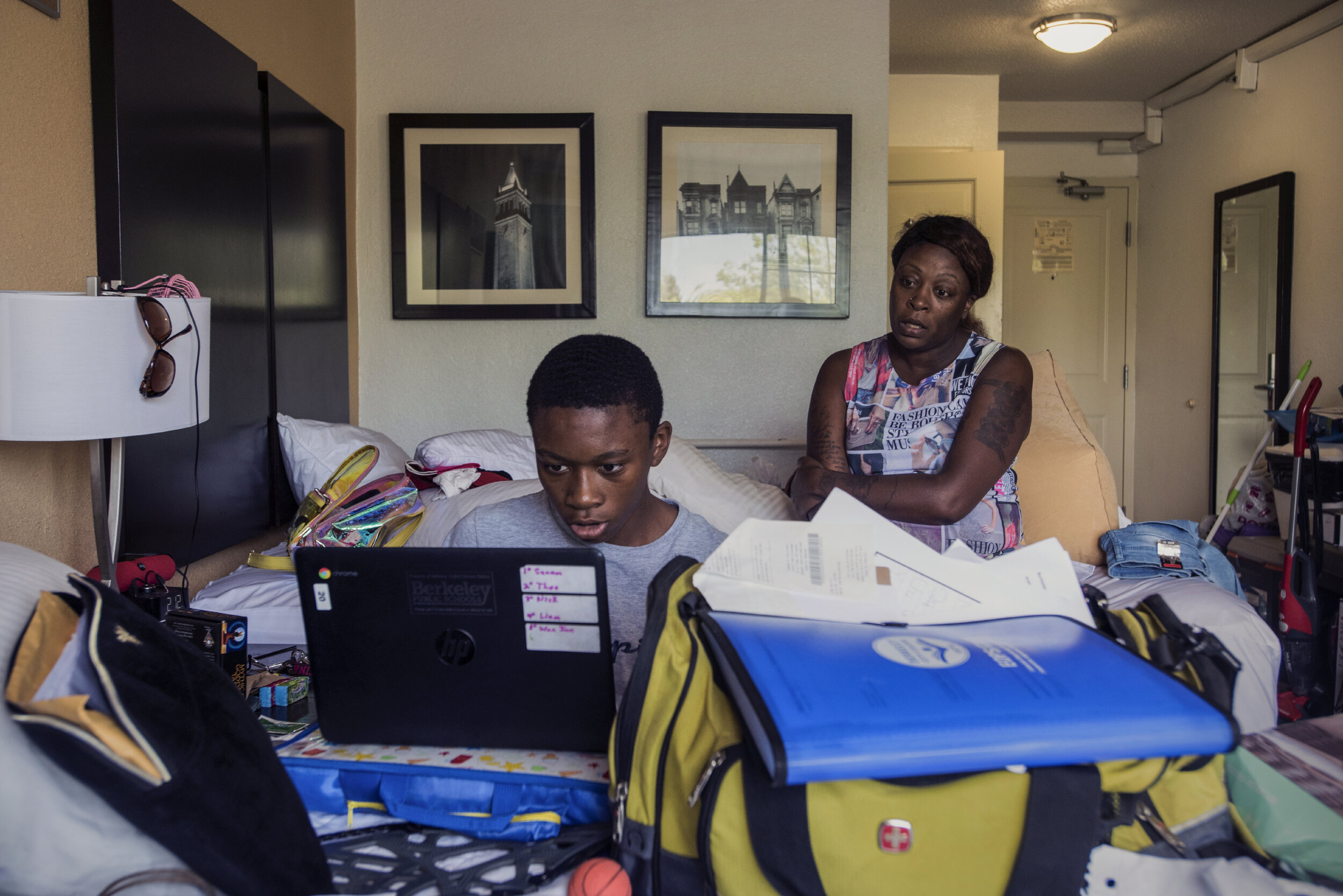
T watches her son K doing online classwork on his Chromebook in their Berkeley motel room. They just received notice that the school district has run out of money to subsidize their lodging costs and they will have to move to a shelter in the next town. This will be difficult because T is also scheduled for essential surgery and will have to recover in the shelter. They have not been able to afford housing since this spring when the pandemic shut down the Golden State Warriors, as Tina makes a living working in food and beverage concessions. She is studying online for her degree at Berkeley City College and dreams of opening her own beverage business.
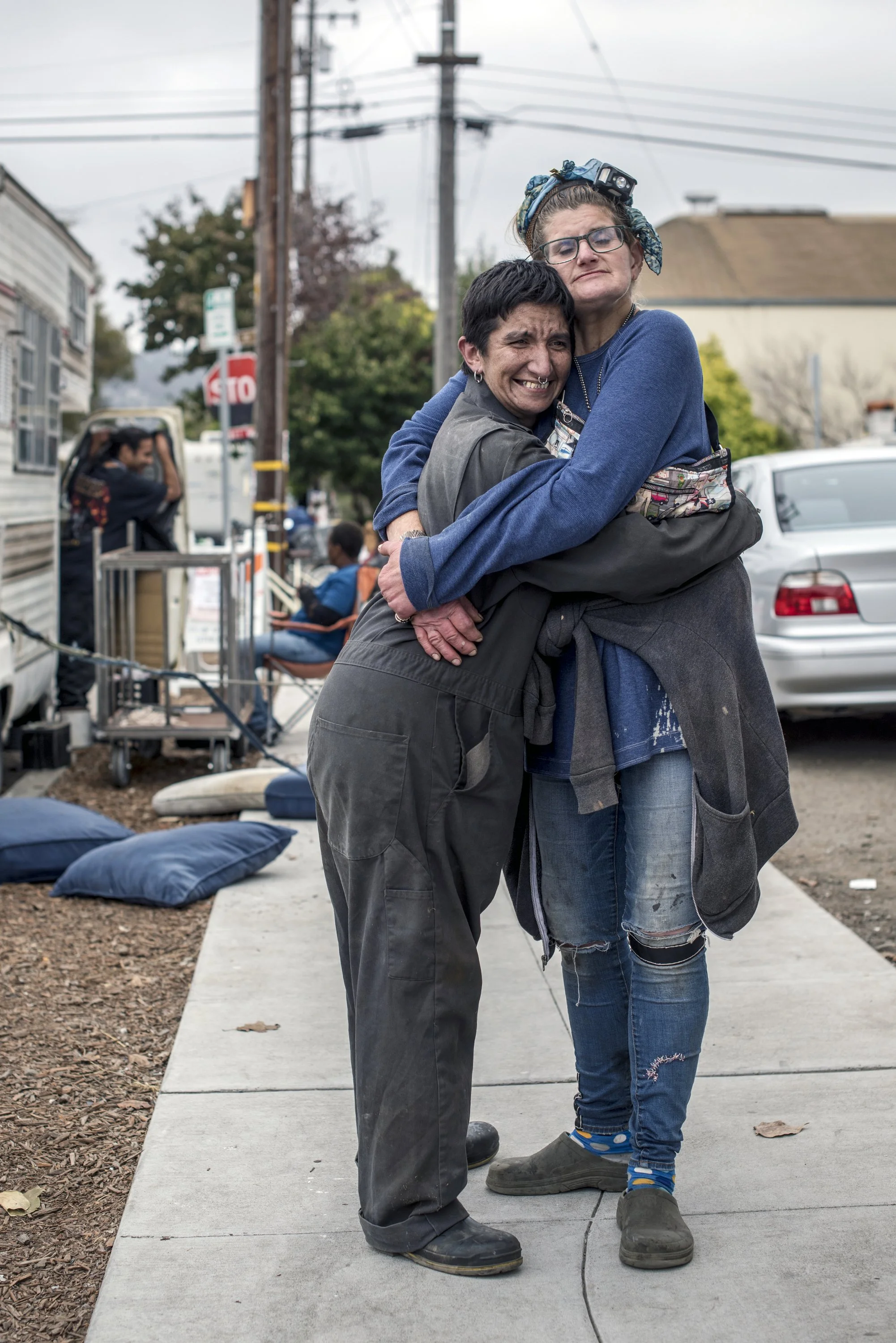
A and S have been friends on the streets for more than 20 years. S has come to support A during a possible police sweep of inhabited vehicles parked on 8th and Harrison in Berkeley.
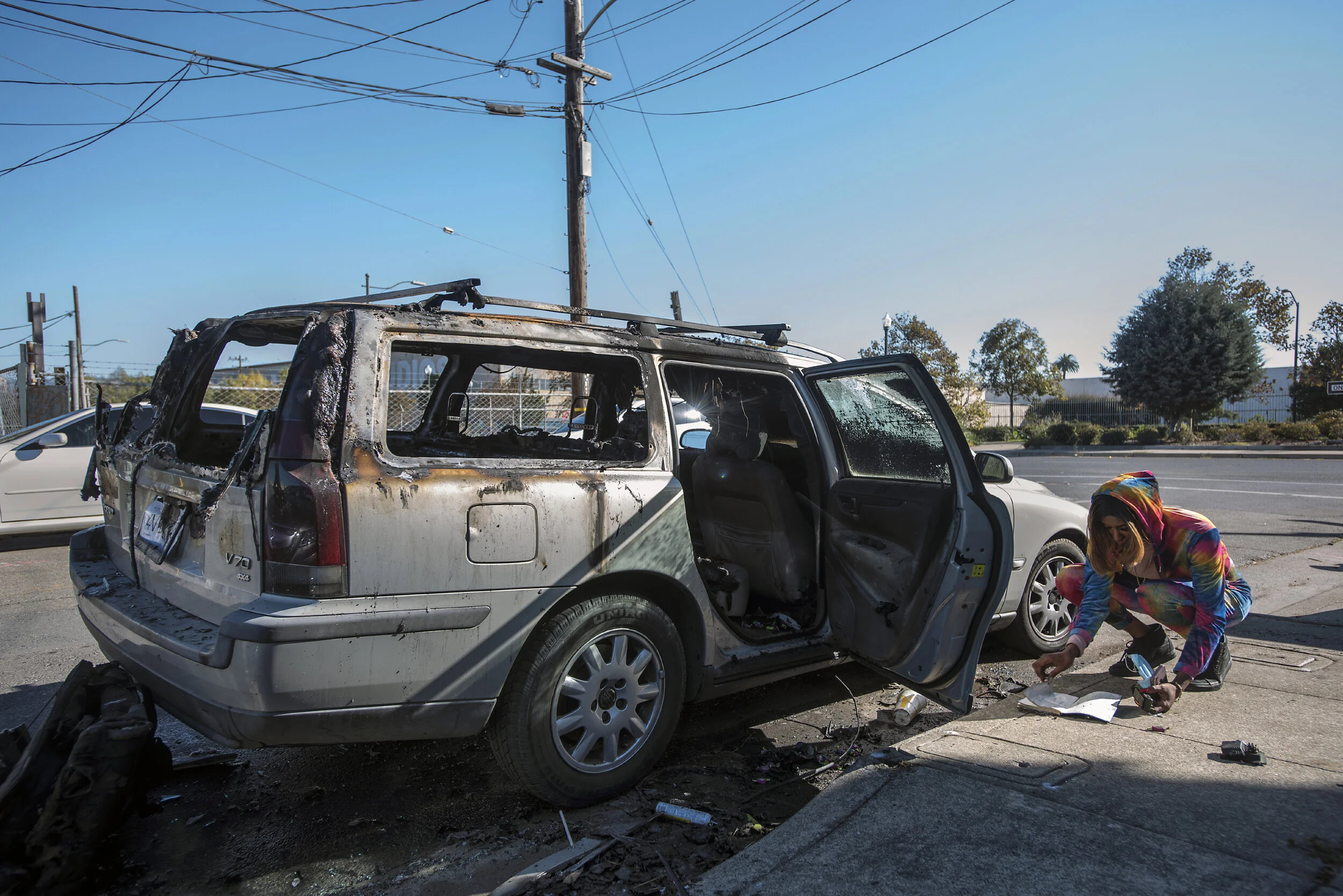
J was living out of her car parked on a residential Oakland street but was luckily not home when a former boyfriend torched the vehicle and most all of her belongings. She flips through a notebook as she tries to salvage other items from the charred mess.

At Union Point in Oakland, a memorial for K, who used to live in this camp. The trophies were salvaged from a trophy shop. K died of gunshot wounds on May 11, 2019. He was 24 years old.

Longtime activist/artist/lawyer for the unhoused O talks with J about their lawsuit against the city to prevent eviction of the Ashby/Shellmound freeway exit encampment by a real estate company developing the land into condominiums. The TRO was granted, but eventually the residents were relocated to temporary hotel rooms.
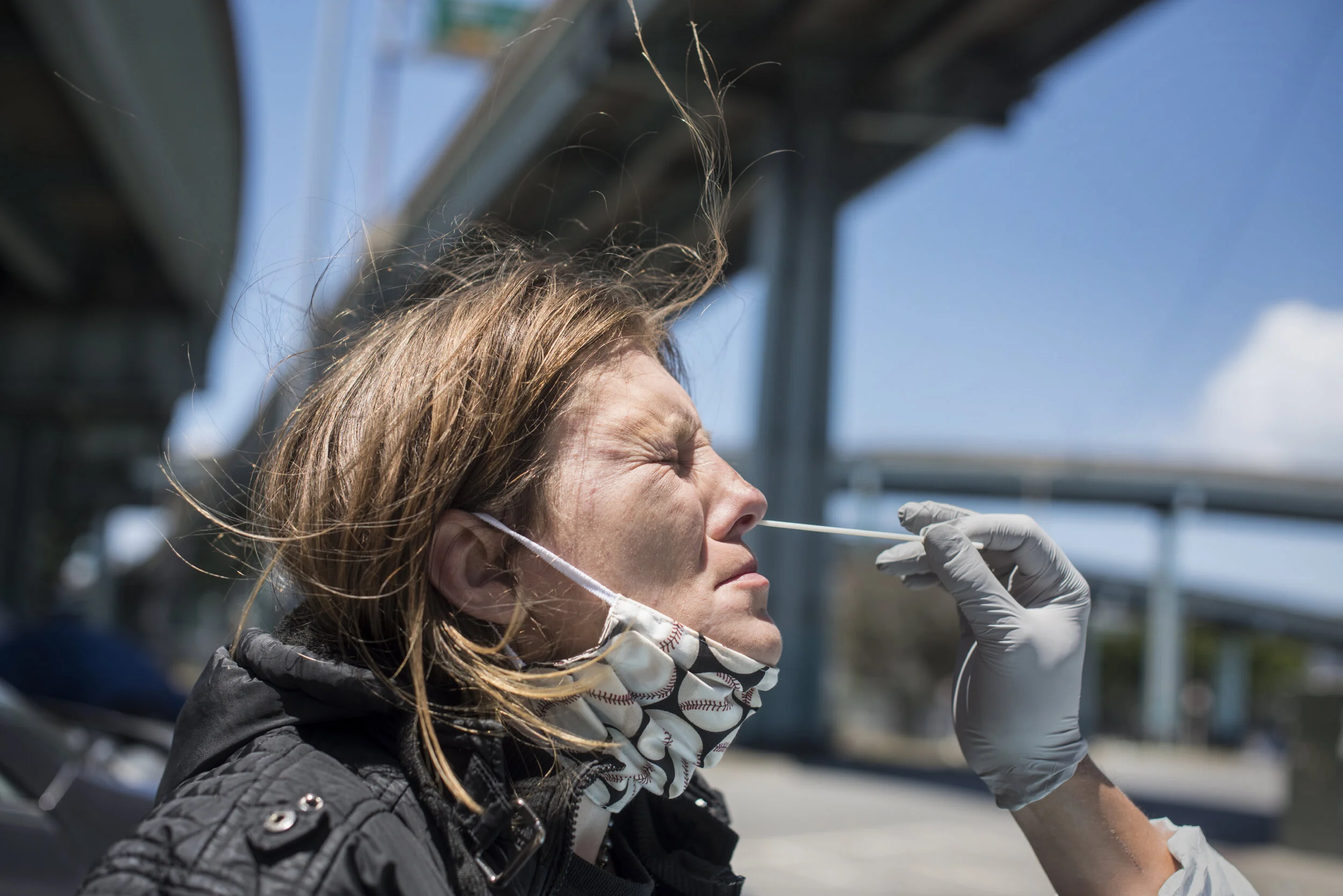
B, 38, who lives in a tent in front of San Francisco City Hall, gets swabbed for covid at a location on the other side of town. She has been on the street for 10 years.

Drug users ingest fentanyl and other substances at bus stop on Market Street in downtown San Francisco, within direct sight of City Hall.

R, 34, had to stop working because of recurring hernia issues and now lives in an RV at Wood Street under the MacArthur Maze. He is now trying to earn money slowly extracting precious metals from computer circuit boards by heating them in a pot of nitric acid over an improvised stove. He says every time he sees a discarded device, he breaks it open and removes the innards - at this point he has collected about a thousand pounds of circuit boards to process.

Homefulness is a project run by POOR Magazine, a grassroots organization of low-to-no income activists, housed and unhoused, that purchases or “liberates” vacant lots to build actual multi-unit apartment buildings to house people in need. M, dressed in Aztec costume, and H perform a ceremony consecrating a new location at 76th and MacArthur in “deep East” Oakland.
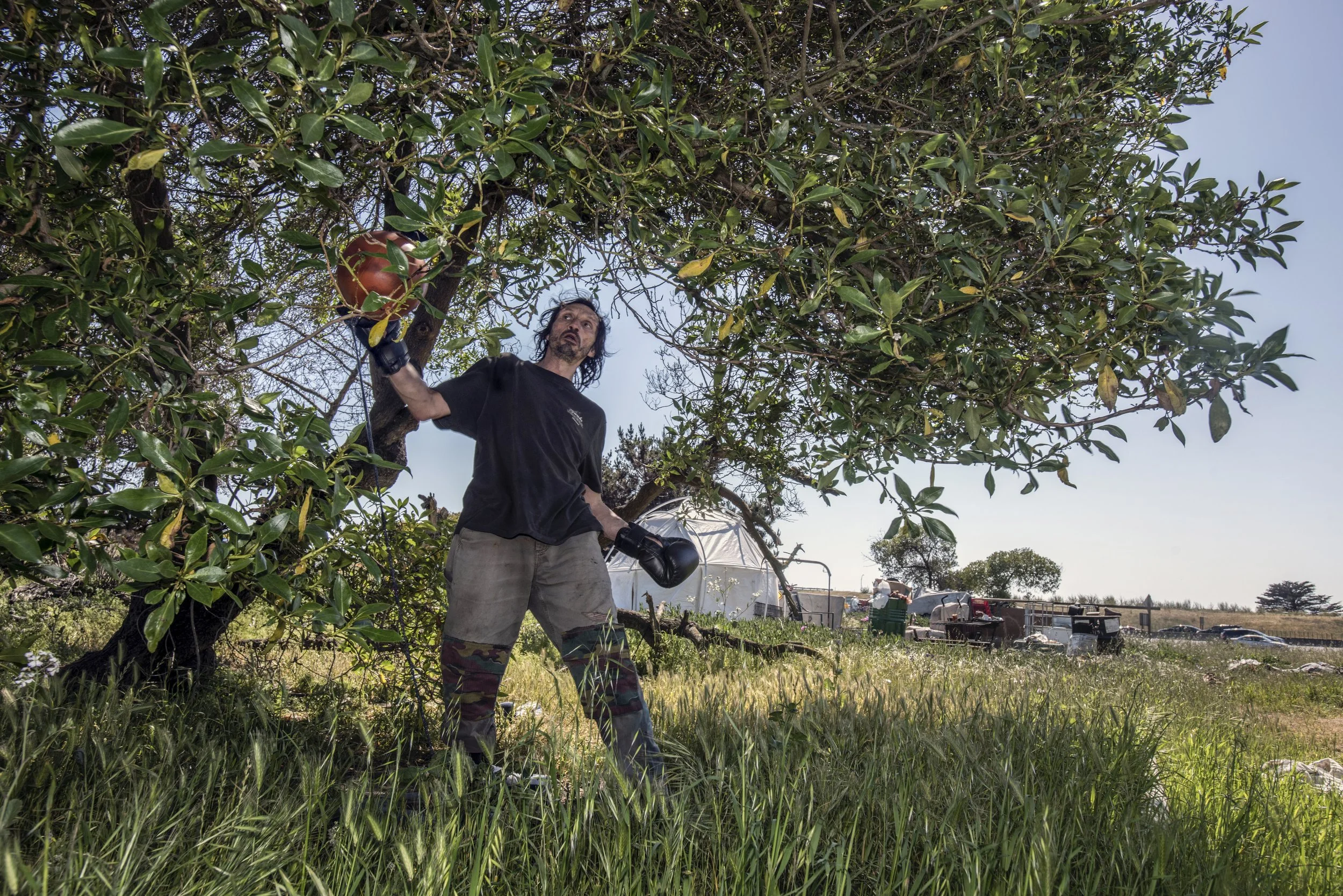
G works out hitting a punching bag that he has strung up near his tent on the freeway cloverleaf. His camp has since been cleared by Caltrans.

For the last five months after being evicted from her apartment, J has lived with two of her five children in an RV parked in East Oakland.

T, with her partner A and their one year-old G in front of their tiny home parked behind the post office. Trinidad, who works for UPS, tested positive for covid in the spring of 2020 but the others did not get sick. She says “I got all the symptoms." Since then, A has disappeared so T has been raising their son by herself
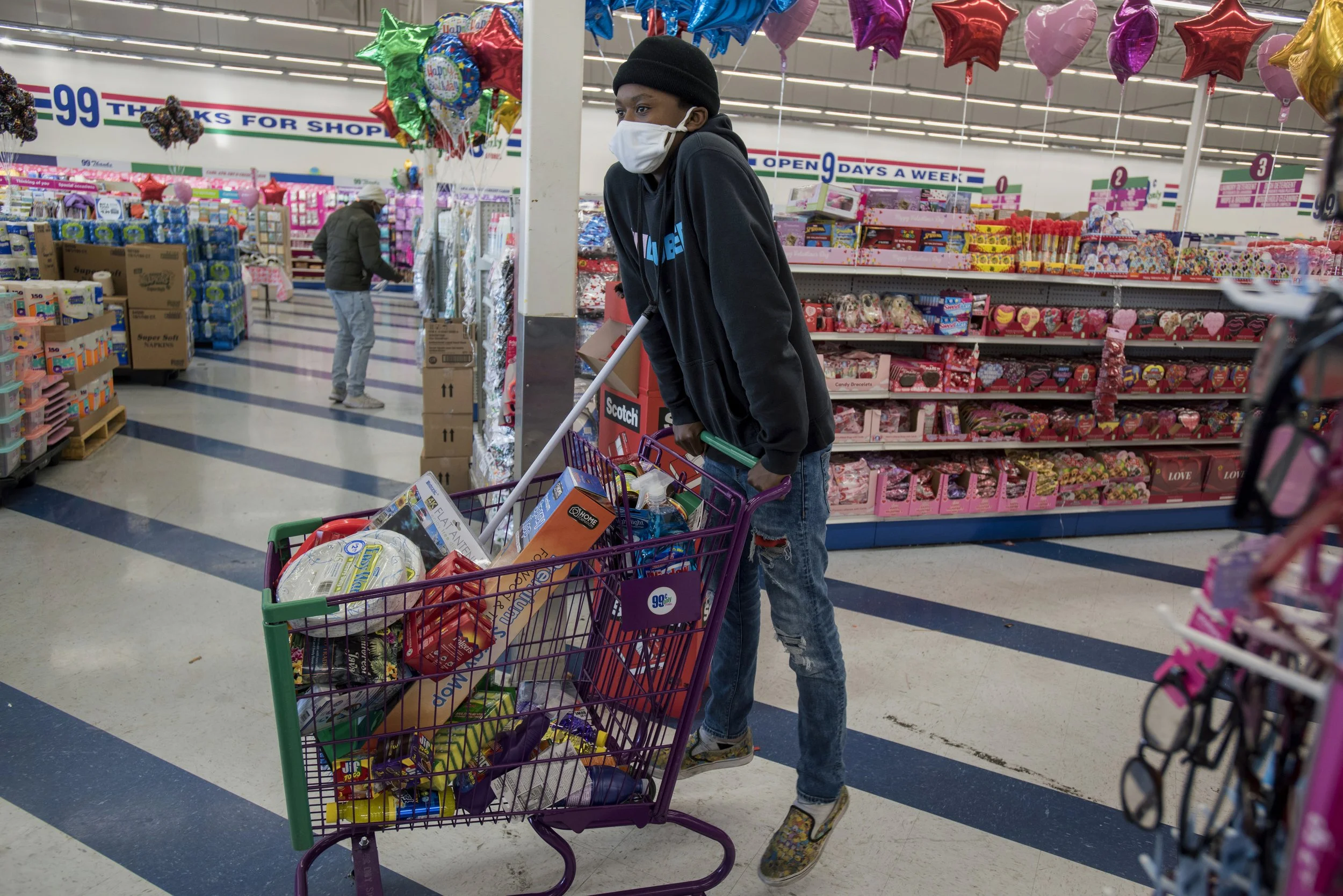
14 year-old K waits for his mother T in line at the 99 Cents Only Store in Richmond. They are buying food and cleaning supplies for themselves others in their city-provided shelter. They have been bouncing around different hotel rooms and shelters since T lost her work in concessions at Golden State Warrior home games when the pandemic started.
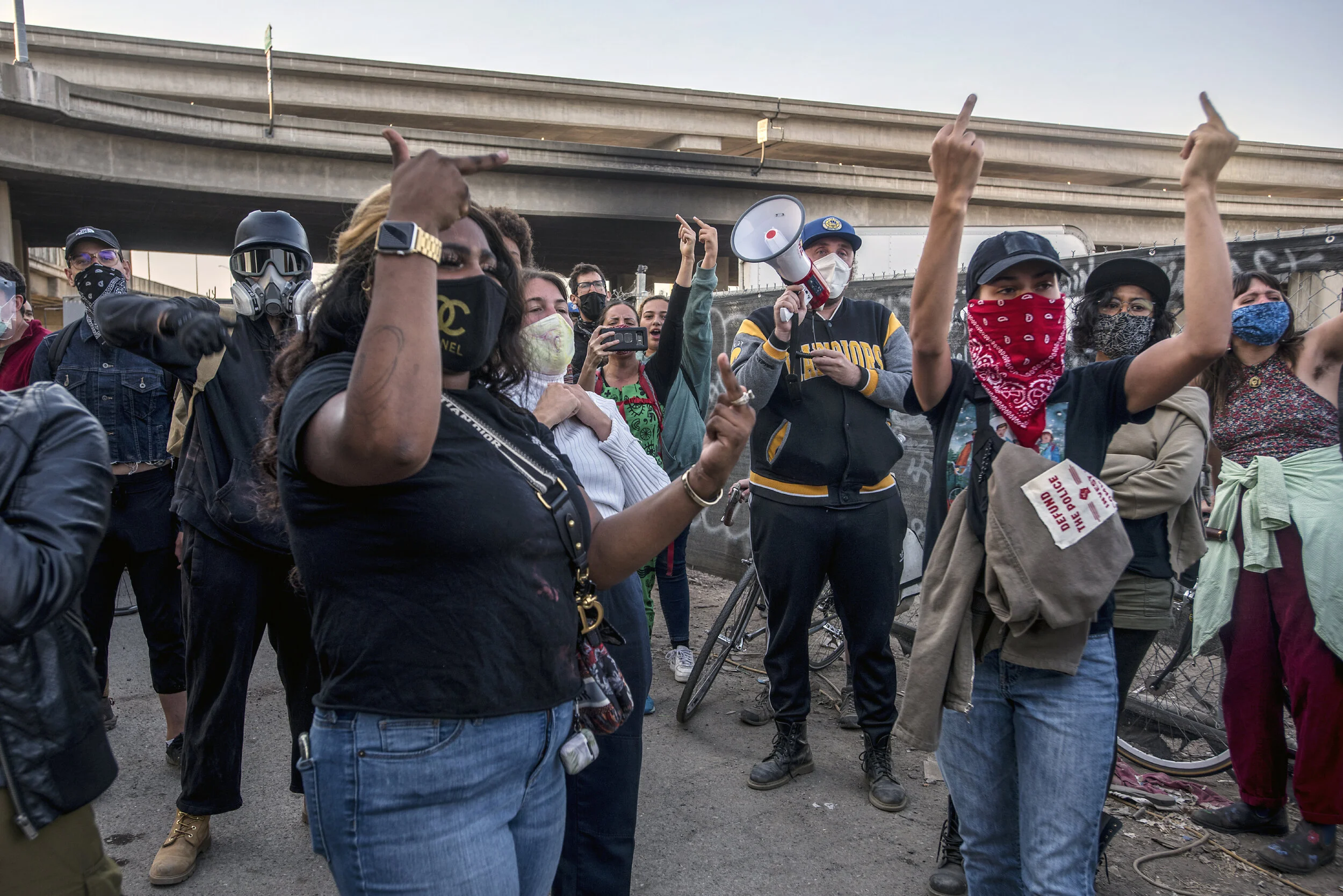
Members of the United Front Against Displacement and others —housed and unhoused — protest against the Alameda County Sheriff department’s action to evict some homeless dwellings on a piece of land owned by a investment company.
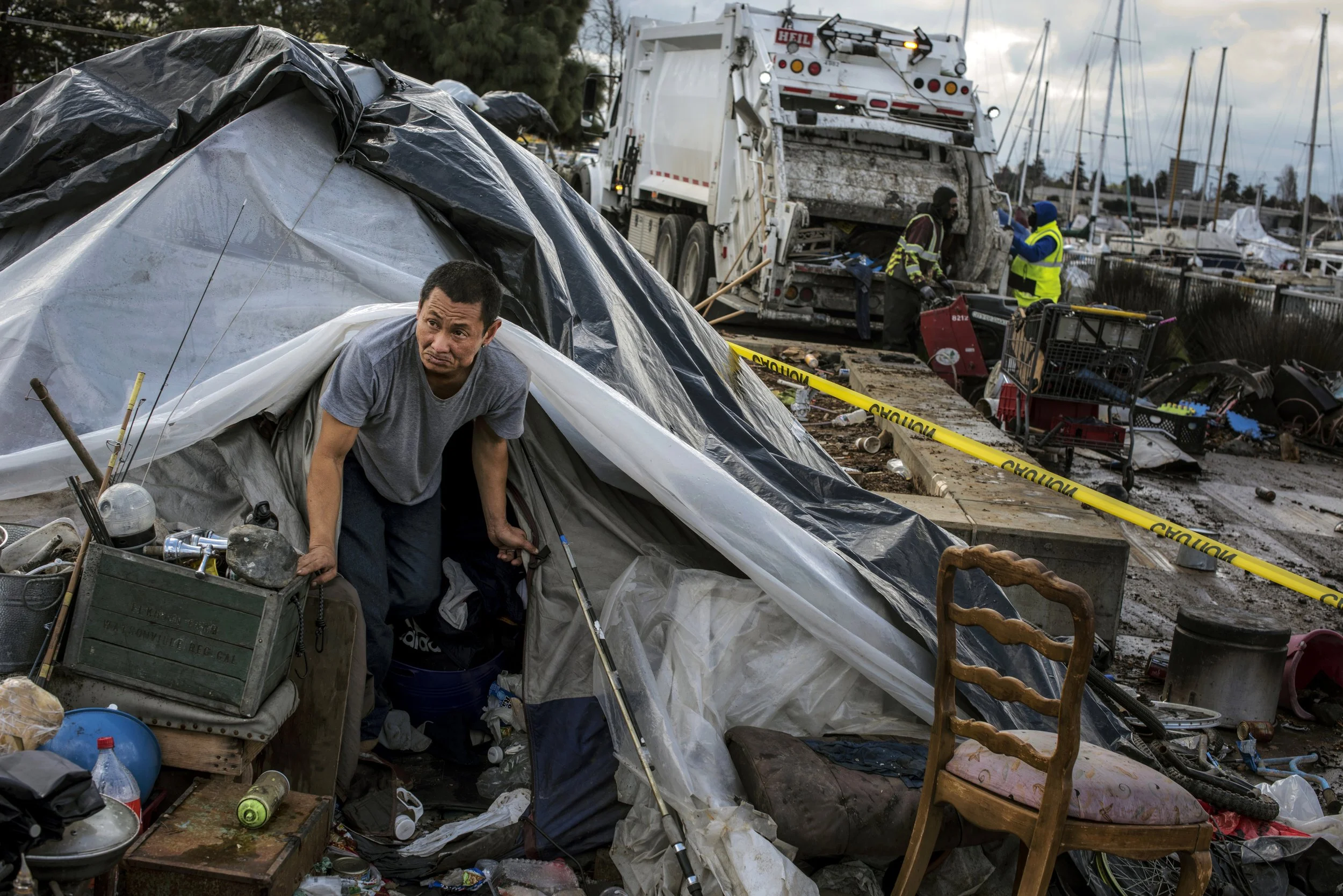
J scrambles to move his belongings out of his tent minutes before city bulldozers and garbage trucks raze the dwellings on the Union Point marina. This encampment was home to unhoused residents for more than ten years until March 2021 after Oakland declared it a health hazard, bypassing the sweep moratoriums. Some residents were provided with temporary rooms by Operation Dignity while government officials looked to set up a new camp spot. Others, like J, had nowhere to go.

D has been embarrassed to smile because of the way his teeth look after years of meth use. After he has received subsidized housing, the next step is to get dentures.

Artist/activist S installs the letters WDWG (for Where Do We Go) by the Ashby/Shellmound freeway exit encampment, in support of the unhoused residents of Berkeley and Emeryville. Caltrans took them down in less than a day and most of the residents were cleared out within a few weeks.
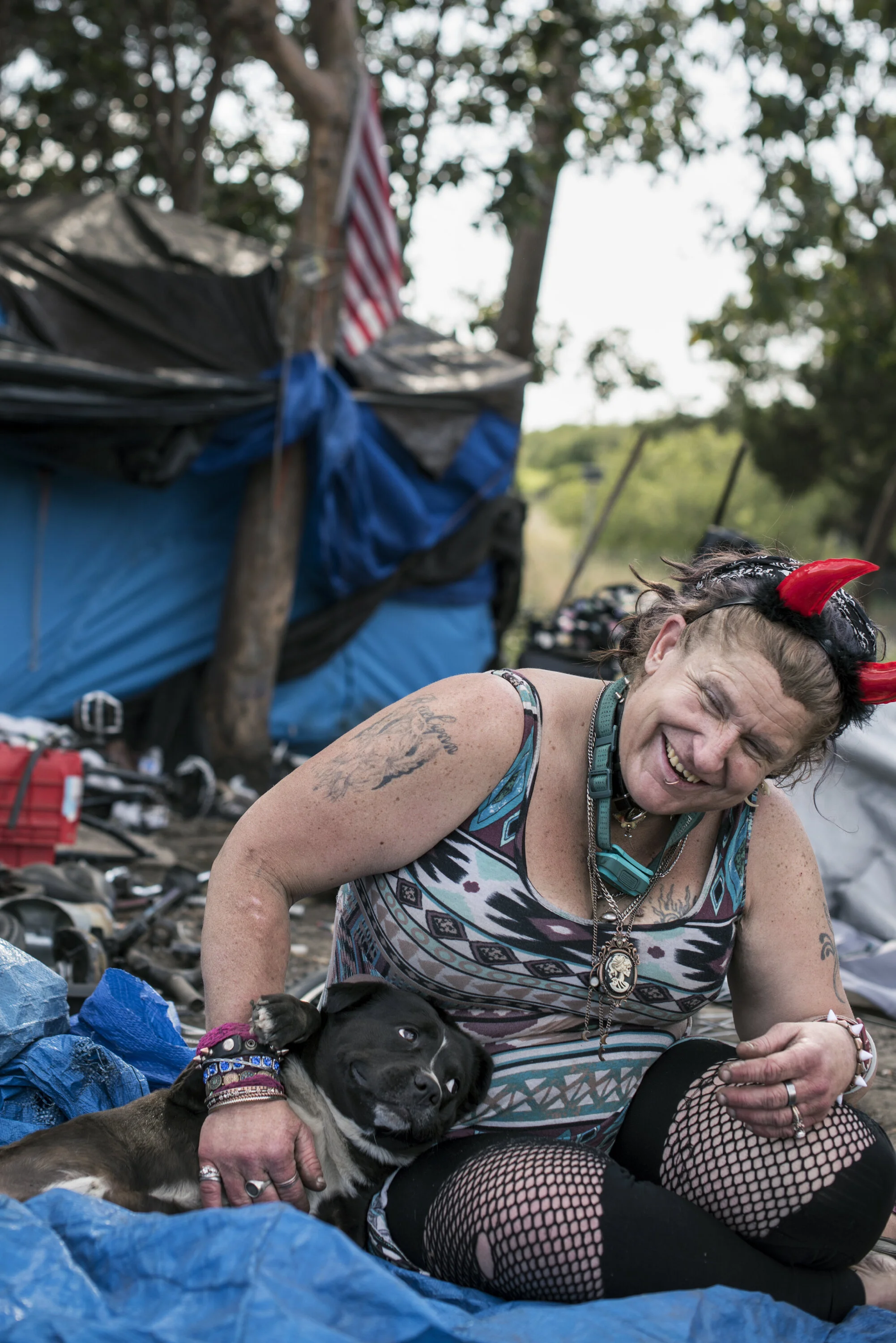
B has traveled all over the country and has now been on the street for 5 years, living beside the University Avenue freeway exit encampment in Berkeley. “We are lucky covid hasn't gotten here yet. We are lucky for the everyday people who help us with food and masks. I don’t wear the mask because it’s hot. In quarantine, the hardest thing is trying to make money — before there was recycling, spare changing. It’s rough because they shut everything down. It’s harder to get food. Everybody’s hurting. It’s a slap in the face to everybody who didnt think it could happen to them. There are rats and ticks but we cant concentrate on the negative shit. 90% of us have mental problems but I feel safe here because we are a community. We tolerate each other.”
Covid/Shelter






































